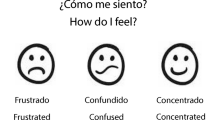Access this chapter
Tax calculation will be finalised at checkout
Purchases are for personal use only
Similar content being viewed by others
References
Adjei, S.A., Baker, R.S., Bahel, V.: Seven-year longitudinal implications of wheel spinning and productive persistence. In: Roll, I., McNamara, D., Sosnovsky, S., Luckin, R., Dimitrova, V. (eds.) AIED 2021. LNCS (LNAI), vol. 12748, pp. 16–28. Springer, Cham (2021). https://doi.org/10.1007/978-3-030-78292-4_2
Baker, R.S.J.d., D’Mello, S.K., Rodrigo, M.T., Graesser, A.C.: Better to be frustrated than bored: the incidence, persistence, and impact of learners’ cognitive-affective states during interactions with three different computer-based learning environments. Int. J. Hum.-Comput. Stud. 68(4), 223–241 (2010)
D’Mello, S.K., Lehman, B., Pekrun, R., Graesser, A.C.: Confusion can be beneficial for learning. Learn. Instr. 29(1), 153–170 (2014)
Grawemeyer, B., Mavrikis, M., Holmes, W., Gutiérrez-Santos, S., Wiedmann, M., Rummel, N.: Affective learning: improving engagement and enhancing learning with affect-aware feedback. User Model. User-Adapt. Interact. 27(1), 119–158 (2017). https://doi.org/10.1007/s11257-017-9188-z
Hansen, A., Mavrikis, M., Geraniou, E.: Supporting teachers’ technological pedagogical content knowledge of fractions through co-designing a virtual manipulative. J. Math. Teach. Educ. 19(2), 205–226 (2016). https://doi.org/10.1007/s10857-016-9344-0
Janning, R., Schatten, C., Schmidt-Thieme, L.: Feature analysis for affect recognition supporting task sequencing in adaptive intelligent tutoring systems. In: Rensing, C., de Freitas, S., Ley, T., Muñoz-Merino, P.J. (eds.) EC-TEL 2014. LNCS, vol. 8719, pp. 179–192. Springer, Cham (2014). https://doi.org/10.1007/978-3-319-11200-8_14
Kort, B., Reilly, R., Picard, R.: An affective model of the interplay between emotions and learning. In: IEEE International Conference on Advanced Learning Technologies, no. 43–46 (2001)
Mavrikis, M., Rummel, N., Wiedmann, M., Loibl, K., Holmes, W.: Combining exploratory learning with structured practice educational technologies to foster both conceptual and procedural fractions knowledge. Educ. Technol. Res. Dev. (2022). https://doi.org/10.1007/s11423-022-10104-0
Pekrun, R.: The control-value theory of achievement emotions: assumptions, corollaries, and implications for educational research and practice. J. Educ. Psychol. Rev. 18, 315–341 (2006). https://doi.org/10.1007/s10648-006-9029-9
Author information
Authors and Affiliations
Corresponding authors
Editor information
Editors and Affiliations
Rights and permissions
Copyright information
© 2022 Springer Nature Switzerland AG
About this paper
Cite this paper
Grawemeyer, B., Mavrikis, M., Holmes, W. (2022). When the Going Gets Tough: Students’ Perceptions on Affect-Aware Support in an Exploratory Learning Environment for Fractions. In: Rodrigo, M.M., Matsuda, N., Cristea, A.I., Dimitrova, V. (eds) Artificial Intelligence in Education. Posters and Late Breaking Results, Workshops and Tutorials, Industry and Innovation Tracks, Practitioners’ and Doctoral Consortium. AIED 2022. Lecture Notes in Computer Science, vol 13356. Springer, Cham. https://doi.org/10.1007/978-3-031-11647-6_98
Download citation
DOI: https://doi.org/10.1007/978-3-031-11647-6_98
Published:
Publisher Name: Springer, Cham
Print ISBN: 978-3-031-11646-9
Online ISBN: 978-3-031-11647-6
eBook Packages: Computer ScienceComputer Science (R0)




